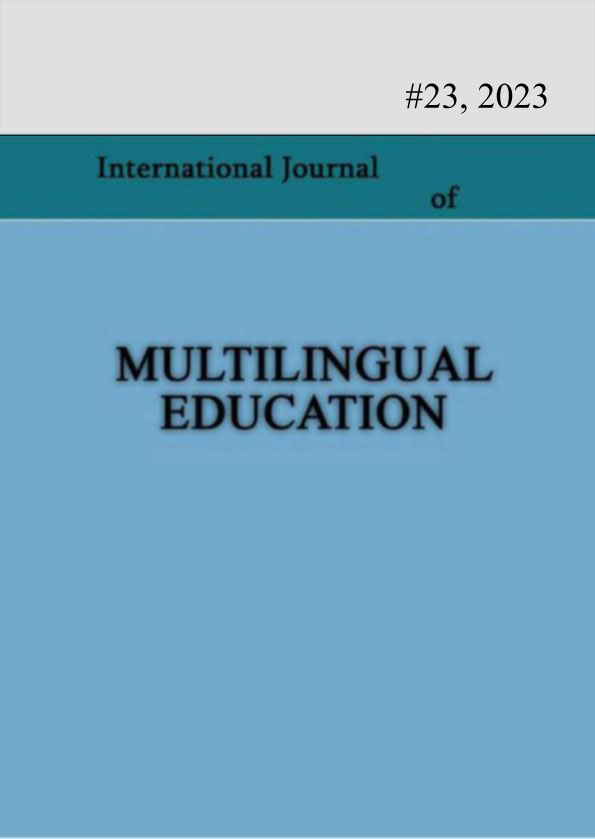How to teach compositional aspect on verbal-aspect languages data: biaspectuality in Bulgarian and Greek
Keywords:
compositional and verbal aspect, perfectivity and imperfectivity, biaspectuality, definite/indefinite/zero article, Bulgarian and Greek grammarAbstract
Compositional aspect (CA) is a well-known phenomenon in general linguistics but its essence is, on the one hand, misconceptualized and, on the other, absent in all major grammars of CA-languages, including English. This paper deals with CA as found peripherally in Bulgarian and Greek, two languages that have verbal aspect (VA) and are also hybrid ones, featuring a regular aspect system in verbs as lexical entries and a definite article (no indefinite). The definite-indefinite-zero article pattern plays a major role for effectuating aspect in CA-languages such as English but the definite article in hybrid languages like Bulgarian and Greek also plays such a role in certain specific semanticosyntactic conditions. The regularity is demonstrated here mainly on the basis of a specific type of sentences – with biaspectual verbs and three situation-participant NPs. As CA exists in VA-languages too, albeit peripherally, the thesis here is that it needs to be covered in larger Bulgarian and Greek grammars (academic, comprehensive) and taught at higher levels of learners’ language knowledge or acquisition – to students seeking language proficiency, to future language teachers, translators/interpreters, other applied and theoretical linguists. The analysis and the conclusions in the paper could also lead the way to solving certain important theoretical issues: how must CA in VA-languages without articles be analyzed? Exactly how must CA be incorporated in grammars and textbooks and taught? Grammars of VA-languages without articles such as the Slavic ones, Georgian, etc. ought to contain chapters describing the major systems involved in the aspect mechanism: the aspectual and the aspecto-temporal system, the nominal determination system, etc. Especially in need of better explanation and understanding are the way definiteness and indefiniteness, genericity, specificity and similar values are effectuated in languages with no articles – something that has been attempted many times in linguistics but never received a convincing description.
References
Bulatović, V. (2020). Thinking for speaking in the right aspect – on whether modern English grammars can do more. Revista Española de Lingüística Aplicada (RESLA) 33(2): 384– 415.
Bulatović, V. (2022). Aspect semantics and ESL article use. International Review of Applied Linguistics in Language Teaching (IRAL) 60(2): 491–521.
Carlson, G.N. (1977/1980). Reference to Kinds in English. Ph.D. dissertation, New York.
University of Massachusetts, 1977): Garland Publishing.
Dimitrova, D. (2021). Aspect coercion in Greek aorist and perfect verb forms. Studies in Greek Linguistics 41. Thessaloniki: Institute of Modern Greek Studies: 45–53.
Downloads
Published
How to Cite
Issue
Section
License
Copyright (c) 2023 Krasimir Kabakčiev, Desislava Dimitrova

This work is licensed under a Creative Commons Attribution-NonCommercial 4.0 International License.
Copyright (c) - Authors who publish with this journal agree to the following terms: Authors retain copyright and grant the journal the right of first publication with the work simultaneously licensed under a Creative Commons Attribution-Noncommercial 4.0 International License, which allows others to share the work with an acknowledgement of the work's authorship and initial publication in this journal. Authors are permitted and encouraged to post their work online (e.g., in institutional repositories or on their personal website) prior to and during the submission process, as it can lead to productive exchanges, as well as earlier and greater citation of published work (see The Effect of Open Access). Authors may enter into separate, additional contractual arrangements for the non-exclusive distribution of the journal's published version of the work (e.g., post it to a repository or publish it in a book), with an acknowledgement of its initial publication in this journal.

